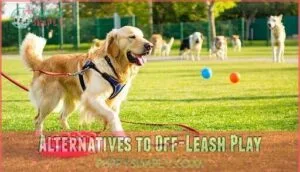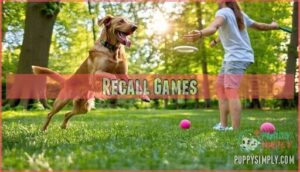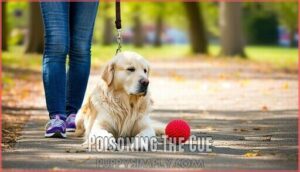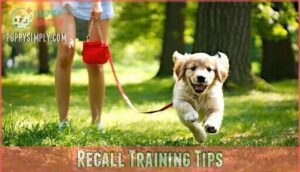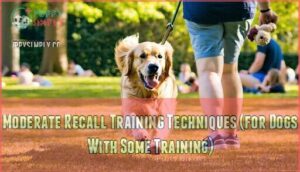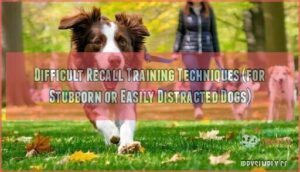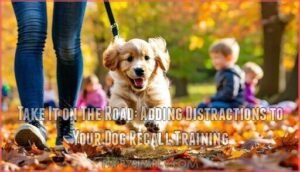This site is supported by our readers. We may earn a commission, at no cost to you, if you purchase through links.
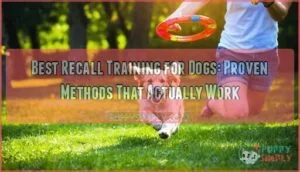
You’ll want to use high-value treats, praise, and play as rewards every single time they return to you.
Start training indoors with minimal distractions, then gradually add challenges.
A long leash gives you control while they’re learning.
Never call your dog to come for something they won’t enjoy – that’s like calling someone over just to give them bad news.
Practice short, frequent sessions rather than marathon training days.
Your dog’s safety depends on reliable recall, so consistency beats perfection.
The secret lies in understanding what motivates your specific dog, and using high-value rewards to encourage them.
Table Of Contents
- Key Takeaways
- What is Reliable Recall?
- Alternatives to Off-Leash Play
- Training Recalls
- Recall Games
- Poisoning The Cue
- Recall Training Tips
- Easy Recall Training Techniques (for Puppies)
- Moderate Recall Training Techniques (for Dogs With Some Training)
- Difficult Recall Training Techniques (for Stubborn or Easily Distracted Dogs)
- Take It on The Road: Adding Distractions to Your Dog Recall Training
- Frequently Asked Questions (FAQs)
- What is the most important command to teach a dog?
- How do I keep my dog motivated to come to me?
- What should I do if my dog stops responding to the cue?
- How do I transition from treats to real-life rewards?
- Are there any special considerations for puppies when training recall?
- How long does recall training typically take?
- What equipment is essential for recall training?
- Can older dogs learn reliable recall commands?
- How do you fix a broken recall?
- Should you practice recall training daily?
- Conclusion
Key Takeaways
- Start indoors with high-value rewards – Begin recall training in your living room using treats, praise, and play that your dog finds irresistible, then gradually add distractions as they master the basics.
- Never poison your recall cue – Do not call your dog to come for negative experiences like ending playtime or giving medicine, as this teaches them that "come" means trouble and breaks their trust.
- Use a long leash for safety during training – Practice with a 20-30 foot training line that gives your dog controlled freedom while preventing them from learning they can ignore your commands.
- Keep training sessions short and consistent – Practice daily for just 5 minutes rather than marathon sessions, focusing on making yourself the most rewarding thing in your dog’s world every single time they return.
What is Reliable Recall?
Reliable recall means your dog drops everything and comes running when called—no matter what’s happening around them.
This life-saving skill kicks in during emergency situations, like preventing your pup from chasing a squirrel into traffic.
Building trust through positive reinforcement and consistent training creates a rock-solid foundation.
Your dog learns that coming when called always leads to good things.
Reliable recall isn’t just convenient; it’s your dog’s safety net when you need them most.
To achieve this, remember to utilize high-value rewards during training sessions, which can lead to high-value results.
Alternatives to Off-Leash Play
Building solid recall training doesn’t mean your dog must stay leashed forever. Smart alternatives let you provide freedom while maintaining safety during the learning process.
Here are three practical options for safe off-leash experiences:
- Long Line Training: Use a 20-30 foot training line for controlled freedom in open spaces, allowing natural movement while maintaining recall training control.
- Leashed Enrichment Activities: Incorporate puzzle toys and scent work during structured walks to mentally stimulate your dog without requiring perfect off leash training.
- Secure Enclosed Areas: Practice dog training in fenced yards or dog parks where recall training tips can be safely implemented. Consider breeds with high recall potential for these activities.
Training Recalls
Successful dog recall training starts with choosing clear recall cues like "come" or "here."
Begin in quiet spaces using treat motivation to reward every successful response.
Use leash training initially, gently guiding your dog while repeating the command.
Practice distance control by gradually increasing space between you and your pup.
Focus on proofing recall through consistent repetition before adding distractions.
Remember, reliable recall takes patience – celebrate small wins as your dog learns to come when called consistently.
Positive reinforcement, including verbal praise techniques, can substantially boost training effectiveness, using positive reinforcement to enhance the learning process with treat motivation.
Recall Games
Games make dog recall training more effective and enjoyable for both you and your pup.
These interactive exercises build enthusiasm while reinforcing positive behaviors through play.
Try these proven recall games to boost your dog’s response:
- Puppy Ping Pong – Family members take turns calling your dog back and forth
- Hold Me Back – Have someone restrain your dog while you run away, then call them
- Center Universe – Toss treats away, then call your dog back to you
- Chase Me – Sprint away from your dog, stop, and call them over
Game benefits include increased motivation and faster learning through positive reinforcement recall methods.
Weimaraners benefit from games that provide mental and physical agility.
Poisoning The Cue
A poisoned cue happens when your dog stops responding to your recall command because it’s been paired with negative experiences.
When your recall command becomes the enemy instead of the invitation, you’ve accidentally taught your dog that "come" means trouble.
This creates fearful recall where your dog associates coming to you with punishment or pain association.
You’ve accidentally taught them that "come" means trouble.
Dog training what’s a poisoned cue becomes clear when you notice your dog hesitating, avoiding eye contact, or ignoring the command entirely.
Maybe you’ve called them over to end playtime, give medicine, or scold them.
These situations poison the recall cue over time.
One common example is when a dog associates the recall command with the end of enjoyable activities, leading to a negative conditioned response.
Recovery requires avoiding punishment completely and embracing humane training methods.
Start fresh with a new recall command and focus on positive reinforcement.
Make coming to you the best thing ever – treats, praise, and play should follow every successful recall.
Consistency across all family members prevents re-poisoning your hard work in dog training.
Recall Training Tips
Mastering reliable recall requires more than just shouting "come here" and hoping for the best. Your success depends on following proven strategies that create lasting results.
Here are five essential recall training tips that’ll transform your dog’s response:
- Use a treat pouch with high-value rewards – Keep motivation within arm’s reach during every training session
- Perfect your reward timing – Click or praise the instant your dog starts moving toward you, not when they arrive
- Maintain training consistency – Practice daily, even if it’s just five minutes in your living room
- Start with a long leash – This safety net prevents your dog from learning they can ignore you
- Apply clicker training principles – Mark the exact moment your dog makes the right choice
Remember, dog training recall isn’t about dominance. It’s about making yourself irresistible. When your dog associates coming to you with amazing things happening, you’ve cracked the code.
To guarantee reliability, remember that recall foundation training is key to preventing the behavior from falling apart in distracting environments.
Easy Recall Training Techniques (for Puppies)
Teaching puppy recall training starts with Puppy First Steps in your living room.
Use high-value treats and practice short sessions of five minutes daily.
Call your puppy’s name, then say "come" with enthusiasm.
When they respond, reward immediately – timing matters for positive reinforcement.
Early socialization helps puppies learn to come when called despite distractions.
Keep training sessions fun and brief to maintain their attention span.
Master these dog training commands indoors before moving outside where more tempting distractions await your growing pup.
To build trust and confidence, consider using positive reinforcement techniques for effective training, focusing on high-value treats and short sessions to ensure a strong foundation in recall training.
Moderate Recall Training Techniques (for Dogs With Some Training)
Once your dog masters basic commands, you’re ready for advanced recall training that builds reliable recall at longer distances.
Start leash progression with a long training line, allowing controlled freedom while maintaining safety. Practice distance increase gradually, rewarding every successful return.
Focus on distraction management by introducing mild temptations like toys or other dogs. Reward phasing helps shift from constant treats to intermittent reinforcement.
Clicker training can help with this, as it uses positive reinforcement methods for desired behaviors. This proofing recall stage prepares your dog for real-world scenarios where long distance recall becomes vital for their safety and your peace of mind.
Difficult Recall Training Techniques (for Stubborn or Easily Distracted Dogs)
Persistence pays off when training stubborn dog breeds who seem to have selective hearing. These challenging pups need your best game plan to succeed.
Here are 5 proven strategies for difficult recall cases:
- Deploy high-value rewards – Use freeze-dried liver, cheese, or whatever makes your dog’s tail wag uncontrollably
- Master long line training – Practice with a 30-foot leash for safety while building distance
- Focus on distraction management – Start in quiet spaces, then gradually add challenges
- Maintain training patience – Short, positive sessions prevent frustration for both of you
- Consider professional help – Expert dog training troubleshooting can break through stubborn patterns
For faster learning, consider using puppy clicker training.
Take It on The Road: Adding Distractions to Your Dog Recall Training
Building on your indoor success, it’s time to test your dog’s recall skills where it really counts. Start your distraction hierarchy with mild challenges like scattered toys or distant voices.
Your leash management becomes vital here—use a long line to maintain control while giving your pup room to explore. Public recall demands patience and strategy. Begin in quiet parks before tackling busier environments.
Each successful response to distractions strengthens your foundation, but don’t rush the process. If your dog fails three times in a row, you’ve jumped ahead too quickly. Remember that positive reinforcement training is key to success.
Real-world application means practicing near playgrounds, other dogs, and tempting smells. This proofing recall phase separates reliable dogs from fair-weather listeners. Remember, offleash training isn’t about perfection—it’s about building enough trust that your dog chooses you over whatever’s caught their attention.
Frequently Asked Questions (FAQs)
What is the most important command to teach a dog?
Like a knight’s trusty steed responding to its master’s call, recall is the most essential command you’ll teach your dog.
It’s potentially lifesaving, ensuring your furry friend returns immediately when called, no matter the situation.
How do I keep my dog motivated to come to me?
Make yourself the most exciting thing in your dog’s world.
Use high-value treats, praise, and play as rewards.
Never call your dog to end fun activities, and always celebrate their return with enthusiasm.
What should I do if my dog stops responding to the cue?
Don’t put all your eggs in one basket with just one cue.
Switch up your recall word, increase reward value, and go back to basics with shorter distances until your dog’s confidence rebuilds completely.
How do I transition from treats to real-life rewards?
Gradually replace treats with life rewards like belly rubs, praise, or favorite toys.
Mix real-life rewards with occasional treats randomly.
Your dog learns that coming when called always brings something good, not just food.
Are there any special considerations for puppies when training recall?
Puppies have shorter attention spans, so keep training sessions brief—just 2-3 minutes.
Start indoors with minimal distractions.
Their natural inclination to follow you makes early recall training easier and more successful.
How long does recall training typically take?
Recall training typically takes several months to years of consistent practice.
You’ll see initial progress within weeks, but reliable recall in distracting environments requires patience, persistence, and regular reinforcement throughout your dog’s life.
What equipment is essential for recall training?
You’ll need a treat pouch, clicker, high-value treats like freeze-dried minnows, and a long leash for safety. Skip retractable leashes—they’re unreliable. Consider a training whistle for distance work.
Can older dogs learn reliable recall commands?
Absolutely, older dogs can learn reliable recall.
It takes patience, consistency, and enticing rewards like treats or toys.
Focus on positive reinforcement and start in low-distraction areas.
With time, they’ll come running every time.
How do you fix a broken recall?
Start fresh with a new cue word since your dog’s learned to ignore the old one.
Practice in low-distraction environments, reward immediately when they respond, and gradually increase difficulty while maintaining high success rates.
Should you practice recall training daily?
Daily practice builds muscle memory, daily repetition creates habits, daily training strengthens bonds.
You should practice recall training daily, even if it’s just five minutes.
Consistency beats intensity every single time for reliable results.
Conclusion
Remember, the best recall training for dogs isn’t built overnight—it’s crafted one successful return at a time.
You’ve got the tools now: high-value rewards, consistent practice, and gradual progression through distractions.
Your dog’s safety depends on this skill, so don’t rush the process.
Start with simple indoor exercises and work your way up to challenging outdoor scenarios, with patience and persistence, you’ll transform your pup into a reliable companion who comes running every time you call, becoming a reliable companion.
- https://www.akc.org/expert-advice/training/reliable-recall-train-dogs-to-come-when-called
- https://www.whole-dog-journal.com/training/teaching-a-reliable-recall
- https://www.houndslounge.com/blog/how-to-teach-your-dog-to-come-reliable-recall-training
- https://caninelearningacademy.com/recall-training
- https://www.youtube.com/watch?v=PEY3c35-wIY

